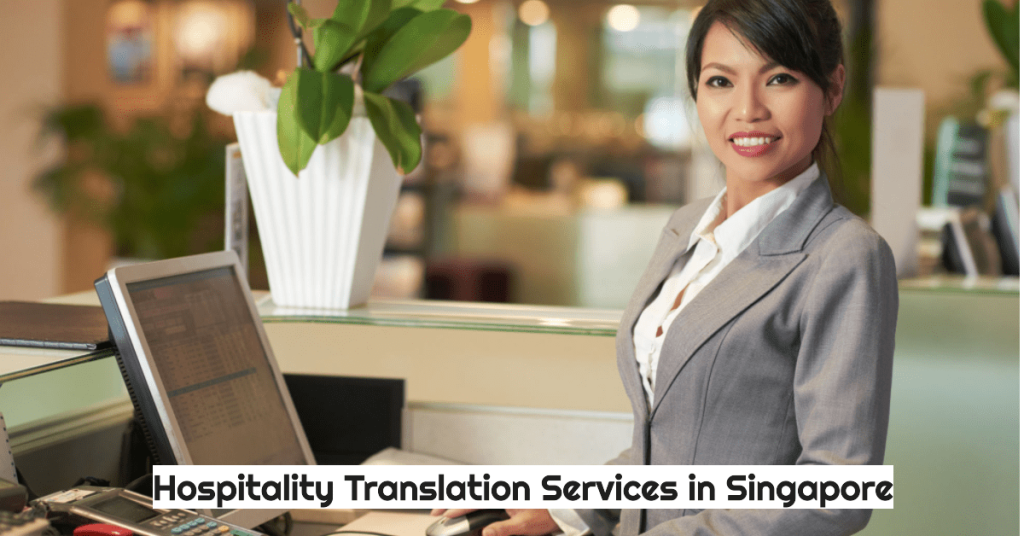Unlocking the Potential of Hospitality Translation Services in Singapore
In our increasingly interconnected world, the hospitality industry stands at the forefront of international engagement, catering to a diverse and global audience.
As travelers venture across borders in search of new experiences, the demand for professional hospitality translation services has never been more critical.
These services bridge cultural and linguistic divides, ensuring that guests feel welcomed and understood, no matter where they are in the world.
This article explores the multifaceted advantages of hospitality translations, how they enhance the travel and tourism experience, and their vital role in making the industry more inclusive and accessible.
What are Professional Hospitality Translation Services?
Understanding Hospitality Translations
Hospitality translations involve the adaptation of language and content to cater to the specific needs of the hotel and hospitality industry.
These services extend beyond mere word-for-word translation, focusing on capturing the essence and nuance of the original message to ensure clarity and cultural appropriateness.
Professional hospitality translation services employ expert translators who are adept at handling the linguistic and cultural complexities inherent in translating hospitality-related content.
This includes everything from menu translations to travel guides and brochures, all crafted to enhance the guests’ experience.
Why Does the Hospitality Industry Need Translation Services?
The hospitality industry thrives on its ability to cater to a diverse clientele from around the globe.
Translation services are essential for hotels, travel agencies, and tourism industries to communicate effectively with their international guests.
By providing information in multiple languages, businesses can offer a seamless experience that respects the linguistic preferences of their guests.
This approach not only improves guest satisfaction but also boosts bookings and customer loyalty, as travelers are more likely to choose accommodations and services that communicate clearly and effectively in their native language.
How Do Translation Services Enhance Travel and Tourism?
Translation services play a pivotal role in enhancing the travel and tourism experience by breaking down language barriers and creating a more inclusive environment for travelers.
High-quality translations ensure that travelers can access accurate and relevant information, from understanding local customs to navigating transportation systems.
Moreover, tourism translation services facilitate better communication between travelers and service providers, thereby enriching the overall travel experience.
By leveraging professional translation services, the travel and hospitality industry can foster a more welcoming atmosphere that accommodates the diverse needs of its global audience.
How Do Hospitality Translation Services Benefit the Hotel Industry?
Improving Guest Experience with Accurate Translation
In the hotel industry, guest experience is paramount.
Accurate translation of hotel materials, such as room service menus, in-room instructions, and promotional materials, ensures that guests feel comfortable and informed during their stay.
High-quality translation services help hotels communicate their offerings effectively, eliminate misunderstandings, and enhance the overall guest experience.
By investing in professional translation, hotels can cater to a diverse clientele, thereby increasing their appeal to international travelers and gaining a competitive edge in the hospitality market.
The Role of Localisation in Hotel Translation
While translation focuses on converting text from one language to another, localization goes a step further by adapting the content to suit the cultural and regional preferences of the target audience.
For hotel website translation, localisation involves tailoring content to reflect local customs, currency, and idiomatic expressions, ensuring that guests receive information that is both relevant and relatable.
This approach not only enhances guest satisfaction but also fosters a deeper connection between the hotel and its guests, as they feel more at home in a foreign environment.
How to Choose the Right Translation Service for Hotels
Selecting the right translation service for hotels involves assessing several factors, including the provider’s expertise in the hospitality sector, their ability to deliver high-quality and accurate translations, and their proficiency in multiple languages.
Hotels should seek out translation services tailored to their specific needs, ensuring that the provider has a track record of successful projects in the travel and hospitality industry.
Additionally, the use of advanced tools and technology can enhance the translation process, providing seamless and nuanced translations that resonate with international guests.
What is the Importance of Localisation in Tourism Translation Services?
Localisation vs. Translation: What’s the Difference?
While translation and localisation are often used interchangeably, they represent distinct processes.
Do check out our blog article on the differences between localisation and translation services.
Translation is the process of converting text from one language into another, preserving the original meaning.
Localisation, on the other hand, involves adapting content to meet the cultural, social, and contextual expectations of the target audience.
This includes modifying visual elements, adjusting for regional idioms, and ensuring that the content aligns with local customs.
In tourism translation services, localisation is crucial for creating an authentic and engaging experience for travelers, allowing businesses to connect with a global audience on a deeper level.
How Localisation Enhances Travel and Hospitality Communication
Localisation enhances communication in the travel and hospitality sectors by ensuring that messages are not only understood but also culturally resonant.
By integrating local nuances and cultural references, businesses can create content that feels familiar and relatable to their audience.
This is particularly important in tourism, where the goal is to provide travelers with an immersive experience that respects and reflects their cultural background.
Effective localisation helps eliminate potential misunderstandings and fosters a sense of trust and comfort, encouraging travelers to engage more deeply with the services offered.
Case Studies: Successful Localisation in the Hospitality Industry
Several case studies demonstrate the success of localisation in the hospitality industry.
For instance, a global hotel chain implemented localised digital marketing campaigns that included region-specific promotions and culturally tailored content.
As a result, they experienced a significant increase in bookings and customer engagement.
Similarly, a travel agency that localised its website and travel guides saw improved interactions and conversion rates, as travelers appreciated the personalised and relevant content.
These examples highlight the tangible benefits of investing in professional translation and localisation services to enhance the travel and hospitality experience.
Why is Website Translation Essential for Global Hospitality Reach?
Benefits of Multilingual Websites in Tourism
Multilingual websites translation are a powerful tool for tourism businesses aiming to expand their global reach.
By offering content in multiple languages, hotels, and travel agencies can attract a broader audience and cater to the linguistic preferences of international travelers.
A multilingual website can improve user experience, increase engagement, and boost conversion rates, as visitors are more likely to book services from a site they can easily understand.
Moreover, offering content in various languages demonstrates a commitment to inclusivity and customer satisfaction, key factors in the competitive hospitality market.
How to Ensure High-Quality Translation for Travel Websites
Ensuring high-quality travel websites translation services involves choosing a professional translation service with expertise in the travel and hospitality industry such as WhizWordz.
Businesses should seek out translators who are not only linguistically proficient but also familiar with industry-specific terminology and cultural nuances.
Additionally, employing technology such as translation memory tools and quality assurance processes can help maintain consistency and accuracy across all translated content.
By prioritising high-quality translation, travel websites can effectively communicate their brand message and offerings to a global audience.
SEO and Website Translation: What You Need to Know
Search engine optimisation (SEO) is a critical consideration in website translation, as it affects a site’s visibility and ranking in search engine results.
Translating website content without addressing SEO can lead to missed opportunities in reaching potential customers.
To optimise translated content, businesses should incorporate relevant keywords in the target language, adapt meta tags and descriptions, and ensure that URLs are search-friendly.
By integrating SEO strategies into the translation process, tourism businesses can enhance their online presence and attract more visitors from different linguistic backgrounds.
How Can You Ensure High-Quality and Accurate Translation?
Qualities of a Professional Translator in the Hospitality Sector
A professional translator in the hospitality sector must possess several key qualities to deliver high-quality and accurate translations.
These include linguistic proficiency, cultural awareness, and industry-specific knowledge.
Translators should be adept at handling the nuances of language and able to convey the intended message without losing its original meaning.
Furthermore, they should be familiar with the terminology and practices unique to the travel and hospitality industry, ensuring that translations are relevant and precise.
Tools and Technology in Professional Translation Services
Tools and technology play an essential role in enhancing the efficiency and quality of professional translation services.
Translation memory software, for instance, helps maintain consistency by storing previously translated content for future use.
Glossaries and terminology databases ensure that industry-specific terms are translated uniformly across different projects.
Such technological advancements enable translators to deliver seamless and nuanced translations that meet the diverse needs of the hospitality industry.
Steps to Ensure Seamless and Nuanced Translations
To guarantee seamless and nuanced translations, businesses should follow a structured translation process that includes thorough project planning, selection of qualified translators, and rigorous quality assurance checks.
It is crucial to define the scope and objectives of each translation project clearly, ensuring that all stakeholders are aligned.
Regular communication between the client and the translator can help clarify expectations and address any challenges that arise during the translation process.
Finally, conducting a thorough review and editing phase ensures that the final product meets the high standards expected in the travel and hospitality industry.
Expand Your Market Reach with WhizWordz Hospitality Translation Service
Ready to welcome the world to your brand? In today’s global hospitality industry, language can make or break a guest’s experience. Whether you manage a luxury hotel, boutique resort, restaurant group, or travel platform, clear and culturally tuned communication is essential to earning trust and driving bookings.
WhizWordz provides specialised hospitality translation services designed to capture the warmth and professionalism of your brand in every language. From hotel websites and booking engines to menus, guest guides, marketing campaigns, and in-room collateral, our native-speaking translators ensure every word reflects your unique style and service standards.
We don’t just translate text—we adapt it to local customs and expectations so international travellers feel instantly at home. The result? Seamless guest interactions, stronger reviews, and higher occupancy rates.
Expand your reach to travellers worldwide and elevate every touchpoint of the guest journey. Contact WhizWordz today to discover customised hospitality translation solutions that help your property stand out—and stay fully booked—across global markets.
Frequently Asked Questions (FAQs)
Q1: What are professional hospitality translation services?
A: Professional hospitality translation services are specialised translation solutions that cater to the needs of the travel and tourism industry. They ensure effective communication by providing precise translations of hospitality content, such as hotel descriptions, travel itineraries, and marketing materials.
Q2: Why do I need a translation for my hospitality business?
A: If you operate in the hospitality and tourism sector, you need a translation to effectively communicate with international clients. Quality translation helps you connect with your audience, making your services more accessible and enhancing customer satisfaction.
Q3: What types of translations can I expect from travel translation services?
A: Travel translation services typically include travel and tourism translations, hotel and hospitality translation services, marketing translation, and translations for booking platforms. These services cater to all your translation needs in the travel industry.
Q4: What languages do your professional hospitality translation services that you provide in?
A: Our translation services for hospitality industry content cover a wide range of languages, allowing us to provide content translation to any language you may need, ensuring effective communication in diverse linguistic contexts.
Typically, hospitality translation service will involve Simplified Chinese translation, Malay translation, Indonesian translation, Japanese translation and Korean translation. And European language will include French translation, Spanish translation, Portuguese translation, German translation
Q5: Can you help with marketing translation for my travel packages?
A: Yes, we offer marketing translation services that can help you effectively promote your travel packages. Our expert translators understand the nuances of marketing language, ensuring that your message resonates with your target audience.
Q6: How can I choose the right translation partner for my hospitality business?
A: When selecting a translation partner, consider their expertise in the travel industry, their experience with hospitality content, and their ability to deliver quality translations on time. Look for a partner that offers tailored services for the travel sector.
Q7: What are the benefits of using professional hotel translation services?
A: Professional hotel translation services provide several benefits, including enhanced customer engagement, improved online visibility, and increased bookings. Accurate translations help build trust with guests from diverse backgrounds.




